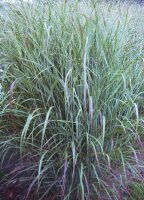- By Daniel Segal, The Plantsmen Nursery, Lansing
- Around Town
 Print
Print  Dan Segal
Dan Segal Dan SegalIn many summers, we'd be nearing the hottest stretch run of the year, heading into August with a gardenful of seared plants. Soils would be drying out and cracking, or just blowing in the wind as dust. Those precious shade plants would be heading for the mountains about now if they could head anywhere. And you, local gardener, would be thinking about the sound of leaves underfoot and the taste of a fall apple. Maybe.
Dan SegalIn many summers, we'd be nearing the hottest stretch run of the year, heading into August with a gardenful of seared plants. Soils would be drying out and cracking, or just blowing in the wind as dust. Those precious shade plants would be heading for the mountains about now if they could head anywhere. And you, local gardener, would be thinking about the sound of leaves underfoot and the taste of a fall apple. Maybe.But this summer is different, and enjoy it while you're living it. This summer is the perfect summer for a garden, for plants, and for the gardener. We've had heat but not too much of it; we've had rains both timely and significant enough to keep things just about perfectly moist; and it's just been really nice out most of the time.
So this summer, you're either working in your garden straight through, or you could be. Here are some things to consider in the summer garden.
- Take some notes (or pictures) of your garden at intervals that will help you add color and fill gaps next year at this time. Many of our customers tell us they have a floral lull around late June or early July. August is a colorful month in many gardens but maybe yours needs more yellow or pink. Now is the time to pay attention to that and decide what you'd like to see more of (or less of).
 Dan Segal
Dan Segal- Look for volunteer seedlings of interesting plants. I 'harvest' from our garden beds all the seedlings and spreading runners of any plants I want to increase for nursery inventory. We just potted a bunch of Ajuga, Alchemilla, Valerian, Helleborus and Sanguisorba from what the garden offered. These seedlings (or pips, pups, babies, freebies...) will grow vigorously in nursery containers because they are actively growing now. When transplanted with a soft touch on a cloudy or rainy day, they may not even miss a day or know what happened.
- Shear/cut back perennials, shrubs and even annuals. I deadhead my forget-me-nots, a shortlived perennial, and we see a second or even third flush of sky-blue flowers with the classic yellow eye. A treat in May and June, so why not encourage them to bloom again in the dead of summer? Almost anything in your garden can be cut back and it will improve the shape, strength, vigor and overall oomph of the plant. Leafy perennials will send up eager new leaves; shrubs will fill in much more thickly after a shearing, and won't get leggy. Annuals will almost always start over after a shearing and do the same things in July/August that they did in spring--grow lots of pretty leaves and then make pretty flowers. Who could argue with that kind of life? Fleeting, yes, but glamorous. Shrubs that bloom on old wood may do best with an earlier shearing so that next year, there is enough older wood that has developed this year. Don't overthink pruning or shearing. Just do it and see how it works. It won't kill anything.
- Learn the best way to hydrate your soil using the least water. I like to trickle a hose in a dry area, sometimes for a few hours. The effect is like a gentle flooding and provides that deep soak you always read about. Sprinklers and overhead irrigation may work if there's enough volume but flooding with a light trickle makes sure all the water gets into the soil (to the roots) where it's used most efficiently. For very new plantings, frequent waterings may be needed until plants are established; for older plantings, the occasional deep watering does far more for your plants' health than frequent shallow watering.

- Invite your friends over to see your garden. Everyone loves to see gardens. Yours is probably nice if you're reading this. Every garden has at least something in it that your visitors haven't seen before. Plus, socializing in the garden is fun, and adds depth, warmth, and memories to the garden.
- Collect seed. Keep your eyes peeled for strange and beautiful seed heads, fruits, capsules, etc. As a rule, seed is ready to collect when it falls out when you touch the head, or when the whole head turns dry and papery (sometimes this is too late), or when fruits turn soft and colorful (ripe). Most seed can be scattered into the garden if you prefer, but save your seed too. Clean it, separating the seed from the chaffy debris, or rinsing the fruit off the seed. Then store in sandy soil in a bag in the fridge or the garage. In spring, sow in pots, flats, or the garden. You'll learn something really interesting about plants, how they reproduce. You'll also end up with free plants, and maybe start a nursery of your own! On second thought...
Happy Gardening
----
v2i29



